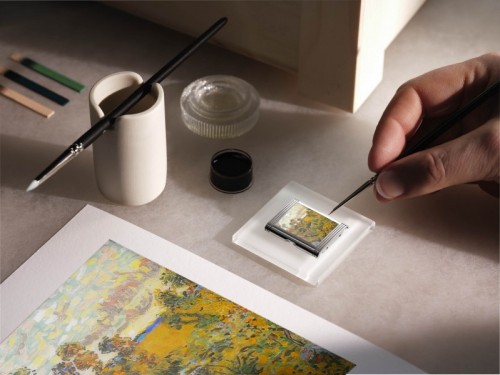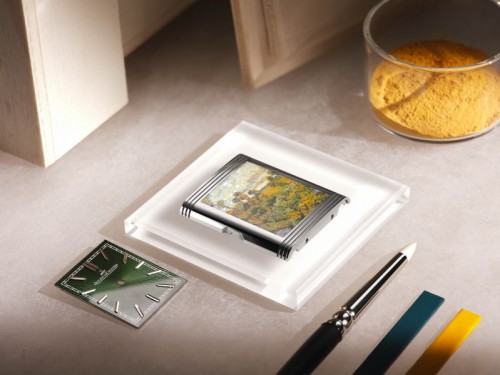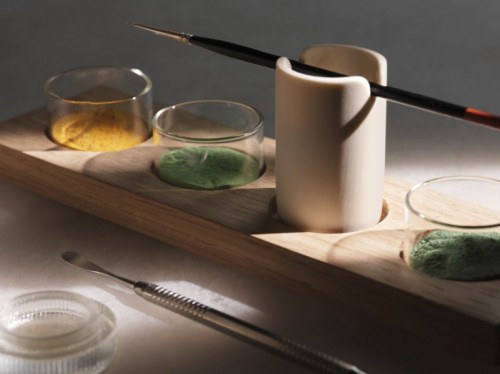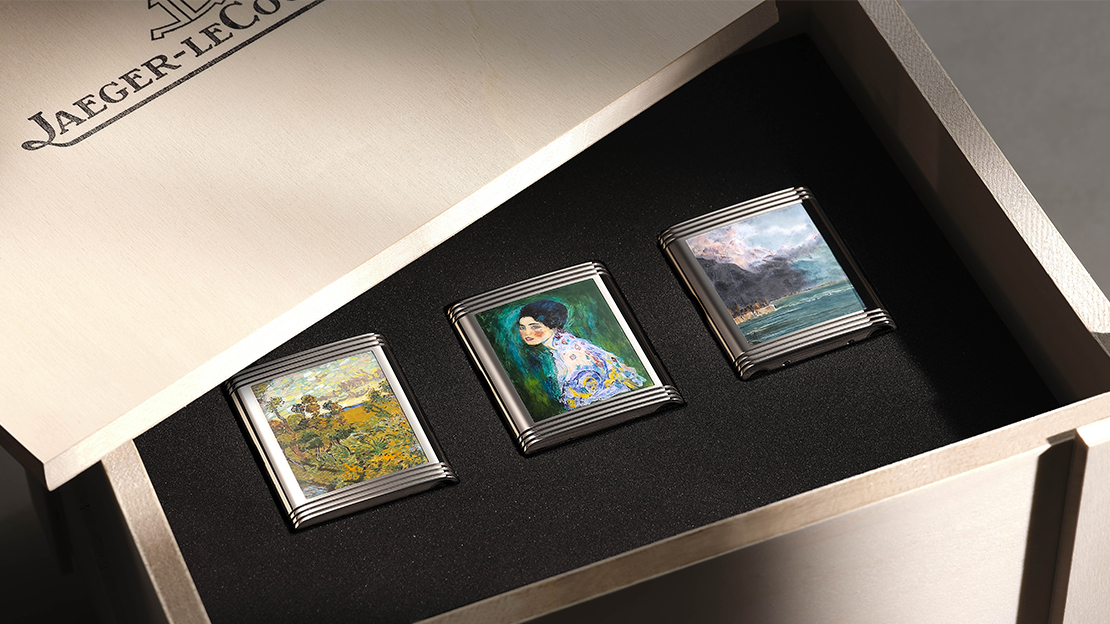In 2021, marking 90 years since the birth of Reverso, Jaeger-LeCoultre introduces Reverso Tribute Enamel Hidden Treasures, a trio of watches that celebrates the work of three great masters from the dawn of Modern Art: Gustave Courbet, Vincent Van Gogh and Gustav Klimt. The new timepieces also unite three distinct artisanal skills practised within the Manufacture Jaeger-LeCoultre: grand feu enamel, miniature painting and guillochage – the latter executed on century-old, hand-turned machines.
The Reverso Tribute collection is closest in its stylistic details to the 1930s originals, and in these three new watches, the signature simplicity of their dials enhances the subtle beauty of the guilloché backgrounds. The colour of each dial – a different shade of misty blue or green – hints at the colours of the enamelled treasures hidden on the reverse side, while the restrained design contrasts with the richness and detail of the miniature works of art.
The three paintings reproduced in the Reverso Tribute Enamel Hidden Treasures triptych represent three markers of a major watershed in the Western artistic tradition, from the 19th-Century Realism of Courbet, to Van Gogh’s Post-Impressionism, to the expressive and experimental spirit of Klimt and the Viennese Secession. To honour the Reverso’s unique ability to hide or reveal the artistic treasure created on its reverse side, the Manufacture’s researchers identified three beautiful paintings that had been hidden from the world for many decades – assumed to have been lost for ever until rediscovered and authenticated in recent years.


Gustave Courbet – View of Lake Léman (1876)
Exiled from his native France in 1873, Gustave Courbet settled near Vevey, on the shore of Switzerland’s Lake Léman (Lake Geneva), where he was inspired by the constantly changing views across the water. In this beautifully atmospheric work, Courbet has captured the movement of the clouds and the sunlight on the lake’s surface.
Reproducing a major portion of the work for the Reverso Tribute Enamel Hidden Treasures, JaegerLeCoultre’s master enameller has perfectly captured the delicate colour palette, fine details and evocative atmosphere of the original. The soft tones of the painting are perfectly complemented by the gleaming white gold case, and by the subtle herringbone guilloché texture of the misty grey-blue dial.


Vincent Van Gogh – Sunset at Montmajour (1888)
After moving to the South of France in 1888, Van Gogh experimented with new styles of visual expression. Painted directly from life on a summer evening, Sunset at Montmajour is an example of the artist’s quest to portray nature in new ways – capturing the distinctive vegetation of Provence and the rich colours of the ‘golden hour’ just before sunset.
For the Reverso Tribute Enamel Hidden Treasures, Jaeger-LeCoultre’s master enameller faithfully reproduces the strong sense of perspective of the original, as well as the effect of artist’s characteristic brush strokes and heavy impasto. The distinctive shade of green enamel chosen for the sunrayguilloché dial provides an elegant counterpoint to the rich gold and russet tones of the painting.


Gustav Klimt – Portrait of a Lady (1917)
Painted by Gustav Klimt a year before the end of his life, Portrait of a Lady is the only known ‘double’ portrait by the Viennese artist, painted over an earlier work. Klimt had fallen madly in love with a young woman who became his muse, then suddenly died. Attempting to ease the pain of his loss, he painted over her portrait with a new one, of a different lady.
Reproduced in miniature on the case back of the Reverso Tribute Enamel Hidden Treasures, Portrait of a Lady captures the same dreamy quality that Klimt had created. The subject’s elegant pose and fashionable outfit are reproduced in perfect detail, and the green tones of the background create an illusion of depth, just as in the original. The green dial, decorated with grand feu enamel over a fine barleycorn guilloché pattern, beautifully evokes the luminescent quality of the portrait’s background.




Enamelling – a rich tradition at Jaeger-LeCoultre
The art of enamelling has a long history at La Grande Maison, dating back to the pocket watches of the 1890s. The first known Reverso with an enamelled case back is a model commissioned by a client in 1936, featuring a delicately detailed portrait of who is thought to be a Maharani on the reverse side.
Having established its own in-house enamelling atelier in the 1990s – to this day, one of the very few Manufactures to have done so – Jaeger-LeCoultre began in 1996 to reproduce the works of major artists from Europe and Asia on the tiny scale of the Reverso case back.
To reproduce a painting in enamel on the case back of a watch presents several challenges. The enameller’s skill as a draftsman must not only be equal to that of the original artist but must also be reduced to a tiny scale. What’s more, colour must be controlled so as to exactly match the original work of art – and yet, the nature of enamel pigment means that the outcome after firing cannot be exactly predicted. It is a question of the artisan’s judgement, based on many years of experience.
The Courbet and Van Gogh works reproduced for the Reverso Tribute Enamel Hidden Treasures pose a particular challenge: both artists used a heavy impasto, whereby paint is applied so thickly that it is raised above the surface of the canvas. Because this technique of course cannot be duplicated with enamel, the enamellist had to create an illusion of the technique. On the other hand, the luminescent quality of grand feu enamel gives it a particular advantage over oil on canvas: tilting an enamelled surface to catch the light reveals unexpected depth and nuances.



